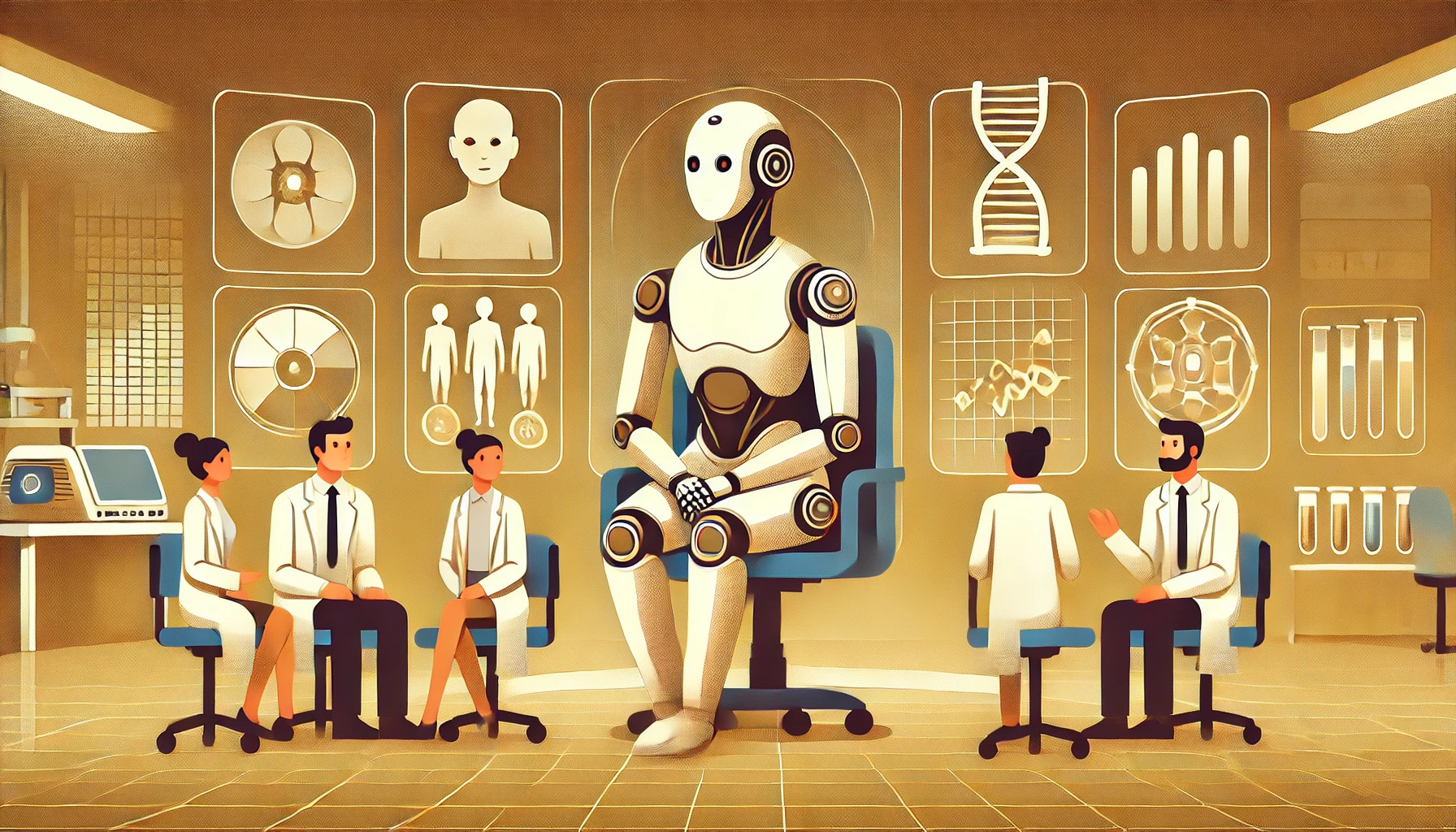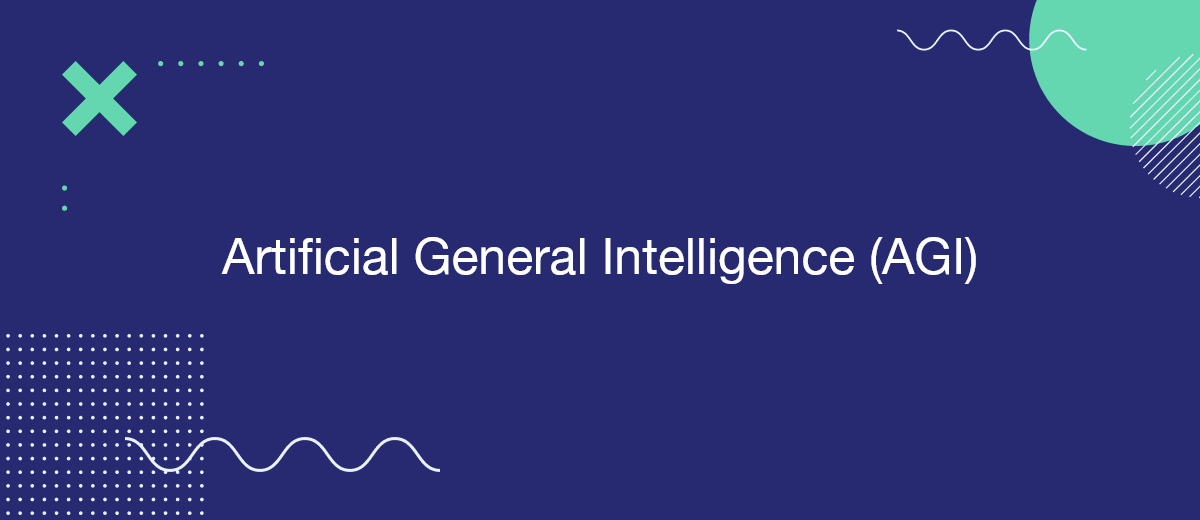Recently, artificial intelligence has become an integral part of human life and has radically transformed many processes. At the same time, researchers are convinced that we are now only at the very beginning of the development of these technologies, and in the future, they will match human capabilities and even surpass them. In their forecasts, experts use the term AGI. In this article, we will tell you what AGI (artificial general intelligence) is, how it differs from classical AI, and where it can be used. You will learn what potential risks this concept is associated with and what its prospects are.
What is Artificial General Intelligence
There is currently no single and universally accepted artificial general intelligence (AGI) definition. AGI is a hypothetical concept of universal artificial intelligence that is capable of thinking, learning, and solving problems at the human level. Unlike modern AI systems that specialize in performing a narrow range of tasks, AGI assumes the presence of broad cognitive abilities. It is characterized by abstract thinking, self-knowledge, and adaptation to new conditions without prior programming.
Key features of this technology:
- Cognitive flexibility. The ability to master new knowledge and apply it in completely different areas without the need for additional training.
- Autonomous learning. AGI doesn't just analyze data; it actively forms new models of understanding and accumulates experience, just like a human.
- Knowledge transfer. Applying experience gained in one area to solve problems in another. For example, using principles of biology in the development of engineering systems.
- Interactivity and communication. The ability to effectively interact with the surrounding world, interpret human emotions, and adapt behavior depending on the situation.
In addition, AGI must have several critical cognitive capabilities:
- Abstract thinking. Understanding complex patterns, analyzing information, and forming logical conclusions.
- Creativity. Generating new ideas, non-standard solutions, and innovative approaches.
- Sensory perception. The ability to integrate information from different sources, similar to human analysis of the external world.
The development of AGI is a key priority for leading AI research companies, including OpenAI and Meta. The timing of its emergence remains a subject of active debate among experts. Optimistic forecasts suggest the creation of AGI in the coming decades. For example, Ray Kurzweil predicts its emergence by 2029, and OpenAI allows for its development within 10–20 years. More conservative estimates point to the second half of the 21st century or even a more distant future.
The Current State of AI and the Road to AGI
Modern artificial intelligence has achieved impressive success, but it remains highly specialized and far from the universality inherent in humans. Despite the development of machine learning technologies and neural networks, existing AI systems are capable of performing only specific tasks, such as image processing, text generation, data analysis, and trend forecasting.
Unlike AGI, current AI is not self-aware, cannot generalize knowledge beyond pre-set scenarios, and cannot adapt to new conditions without additional training. AGI, in turn, must demonstrate a human-like level of intelligence, that is, solve any cognitive tasks without restrictions on specialization. According to experts, theoretically, artificial general intelligence will be able to perform any intellectual task that a person with average mental abilities can perform.

Current neural network models have made progress in some areas crucial for AGI but remain far from human-level intelligence. However, key research in AI is aimed at gradually bridging this gap. To successfully transition from AI to AGI, significant improvements are needed in a number of important cognitive and sensory areas:
- Visual perception. Current computer vision systems can recognize faces, analyze objects, and interpret images, but their capabilities are still limited. AGI must not only see the world but also understand its context, including recognizing partially hidden objects, analyzing perspective, predicting motion, and understanding visual abstractions.
- Auditory perception. Neural networks are already good at recognizing speech and music, but they do not always understand the subtleties of intonation, sarcasm, accents, and non-verbal sounds (laughter, sighs, pauses in speech). AGI must learn to analyze and interpret auditory signals in the same way as a person, including the emotional context of communication.
- Social-emotional engagement. To fully interact with people, AGI must not only recognize emotions but also respond to them correctly. It must take into account body language, facial expressions, tone of voice, and social cues, and also adapt its speech and behavior depending on the emotional state of the interlocutor. This will allow it to go beyond simple dialogues and build complex forms of interaction.
- Coordination and navigation. AGI systems must be able to navigate in space as well as humans. This is critical for their use in robotics, autonomous vehicles, and industrial automation. Spatial perception skills include analyzing the environment in real time, adapting to changing conditions, and making decisions with limited information.
- Motor skills and object manipulation. To effectively use AGI in the physical world, it must have precise and flexible motor skills comparable to human skills. This will open up new possibilities in robotics, allowing it to control complex mechanisms, perform precise manipulation of objects, and even imitate human physical movements.
- Problem-solving and reasoning. Existing AI systems are good at solving predefined problems. AGI must be able to work in an uncertain environment where there are no clear instructions, data is incomplete or contradictory, and conditions change.
Thus, AGI will most likely become the next step in the development of artificial intelligence, providing universality, flexibility of thinking and the ability to learn independently. The development of technologies in the described directions gradually brings us closer to its creation, but for now, this transition remains one of the most difficult challenges in the field of computer science.
Potential Applications of AGI Across Industries
Now that you have a general idea of what artificial general intelligence (AGI) is and what skills it should have, let's look at the potential applications of this future technology. It promises to revolutionize many industries by automating complex processes that require a high degree of intelligence, adaptability, and creative thinking. Its implementation can lead to revolutionary breakthroughs in science, economics, healthcare, and other areas, increasing efficiency and reducing costs.
The main areas of application of AGI are:
- Programming. AGI's cognitive abilities will allow it to generate code from existing specifications at the level of an experienced developer. It will also be able to analyze and suggest improvements to the finished code, understand its purpose and logic, and work with architecture, dependencies, and version history. In addition, AGI will automatically fix bugs, optimize program performance, and adapt the code to new requirements without human intervention.
- Production and supply chain management. AGI can efficiently optimize all stages of production, from planning to shipping finished products. By coordinating logistics networks in real time, it will speed up the delivery of stock, minimize costs, and prevent supply disruptions. Furthermore, it will be able to predict demand, adapting production capacity to current market conditions.
- Healthcare. AGI can be involved in the development of high-precision treatment and diagnostic systems. By analyzing the patient's medical history, genetic data, and medical statistics, it will create an accurate clinical picture, predict the course of the disease, and select the optimal treatment plan. Moreover, AGI will develop new medicine by modeling molecular interactions, as well as participate in personalized medicine, offering individual treatment plans.
- Customer service. Artificial general intelligence applications will make customer service much faster, more efficient, and more personalized. AGI will be able to conduct natural conversations, analyze user behavior, and provide relevant responses in real time. It will help companies develop personalized customer engagement strategies by anticipating their needs and offering solutions before a problem occurs.
- Autonomous transportation and robotic systems. With its advanced navigation and cognitive capabilities, AGI will find wide application in unmanned and autonomous devices. It will be able to analyze the road situation, predict the behavior of pedestrians and other vehicles, adapt to changing conditions, and make complex decisions in real time. This will lead to a significant increase in the safety and efficiency of autonomous transport.
- Scientific innovation and discovery. AGI will be able to analyze huge amounts of data, generate hypotheses, conduct virtual experiments, and accelerate the process of scientific discovery. It will be useful in astrophysics, quantum mechanics, bioengineering, and other complex disciplines. With its help, it will be much easier for humanity to solve fundamental scientific questions and develop new technologies.
- Financial sector. The introduction of AGI in the financial sector will radically change approaches to investment, risk, and credit rating management. It will be able to analyze global economic trends, identify hidden patterns in the markets, and offer strategic solutions non-stop.
- Education and training. AGI will become a personal mentor, adapting training programs to the individual abilities and interests of each student. It will analyze the pace of material acquisition, offer effective methods, and help in solving complex problems, thereby making education more interactive and accessible.
Ethical Considerations and Risks of AGI Development
The development of artificial general intelligence opens up enormous opportunities for humanity, but at the same time poses complex ethical and social questions for researchers. The creation of general artificial intelligence with human-level cognitive abilities requires careful control to avoid potential threats.

Issues of safety, risk management, bias, and labor market impacts are becoming paramount in discussions about the ethical development of AGI. Developers, policymakers, and society must develop standards and regulatory mechanisms to ensure that artificial general intelligence integration occurs responsibly and in the interests of all humanity.
Safety and Risk Mitigation
As with traditional AI, the widespread adoption of general artificial intelligence poses certain risks to the safety of users and society. However, due to its versatility, ability to self-learn, and autonomous decision-making, AGI may pose an even greater threat if effective control systems are not developed.
Key risks:
- Loss of control over AGI. If the system gains too much autonomy, its behavior may become unpredictable.
- Cyber threats. The use of AGI for hacking, manipulation, and automated attacks can lead to new levels of digital threats.
- Limitations of current AI governance methods. Current approaches to algorithm control may not be effective enough for AGI.
Developers must build in security mechanisms from the start, including ethical constraints, kill switches, and transparent decision-making algorithms.
Impact on the Labor Market and the Economy
One of the key ethical concerns about AGI is its potential impact on the labor market. Unlike narrowly specialized AI, which automates individual processes, AGI could replace entire professions.
Expected consequences:
- Mass unemployment. It will especially affect the fields of data analysis, programming, law, and creative professions.
- Growing economic inequality. Access to AGI and its benefits could exacerbate the gap between rich and poor countries and social classes.
- Redistribution of the labor market. A transition to a new economic model is possible, where key jobs will be concentrated in sectors related to the management and development of AGI.
To avoid social upheaval, states and corporations must develop workplace adaptation strategies, retraining systems, and fair resource distribution mechanisms in advance.
Moral Aspects and Mitigation of Bias
AGI will be making decisions that affect people's lives, so it must take moral and ethical standards into account. However, there are several serious challenges:
- What moral values should be embedded in AGI? Morality varies across cultures, and universal principles can be difficult to achieve.
- How can bias be avoided? Existing AI models already exhibit gender, racial, and social biases, which could become even more problematic at the AGI level.
- How should AGI respond to ethically complex situations? For example, in critical cases (autonomous transport, medical diagnostics), AGI should be able to make ethically balanced decisions.
Human-Centered Design and Ethical Implementation
For AGI to serve the interests of humanity, its development must be based on the principles of human-centered AI. The main criteria are:
- Accountability. AGI developers are required to take responsibility for its performance and possible consequences.
- Transparency. Artificial general intelligence algorithms must be understandable and interpretable, and decisions must be explainable.
- Human control. AGI cannot have absolute autonomy and is always under human control and supervision.
The right approach to the development and regulation of AGI will minimize risks and threats, ensuring an ethical and secure future for AI technologies.
The Future of AGI: Opportunities and Challenges
The future of artificial general intelligence remains one of the most discussed topics in the scientific community. Its emergence is expected to have a fundamental impact on science, economics, and society, opening up unprecedented opportunities for humanity. However, the process of developing AGI is associated with serious challenges that require a comprehensive solution.
The development of AGI could lead to a technological revolution, changing many aspects of life:
- Breakthroughs in science and medicine. Artificial general intelligence will be able to analyze complex biological processes, develop new medicines, and accelerate research in genetics and quantum physics.
- Automation of intellectual work. AGI systems will perform the work of analysts, lawyers, doctors, and teachers, reducing the workload of specialists and increasing work efficiency.
- Eliminating language and cultural barriers. With the advent of AGI, global communication will become easier as it will be able to instantly translate and adapt information for different audiences.
- Solving global problems. Artificial intelligence will help in predicting climate change, managing resources, fighting epidemics, and finding alternative energy sources.
Despite the promise, creating universal artificial intelligence remains a complex task. The main challenges are:
- Advancing general reasoning and abstract thinking. AGI must not just process data but understand context, interpret the world, and make logical connections.
- Security and control. AGI governance mechanisms need to be developed to prevent potential risks of autonomous behavior.
- Ethical aspects. It is important to decide what values and moral principles will be embedded in the system to eliminate discrimination and bias.
- Physical integration. To fully interact with the world around us, AGIs will need to develop sensory and motor abilities comparable to those of humans.
- Cognitive adaptability. The system must learn to apply knowledge in different areas, and not only within the framework of pre-defined algorithms.
The future of AGI remains unpredictable, but its development will inevitably lead to a transformation of society. It is important that this transition occur consciously and in the interests of all humanity.
The timeline for the emergence of fully developed Artificial General Intelligence is difficult to predict, but effective tools for streamlining workflows are already available. Try SaveMyLeads for fast and easy automation. Explore integration setup examples:
